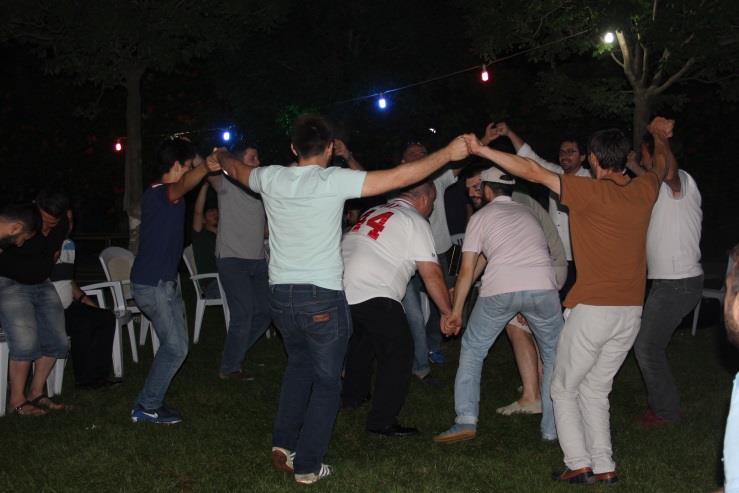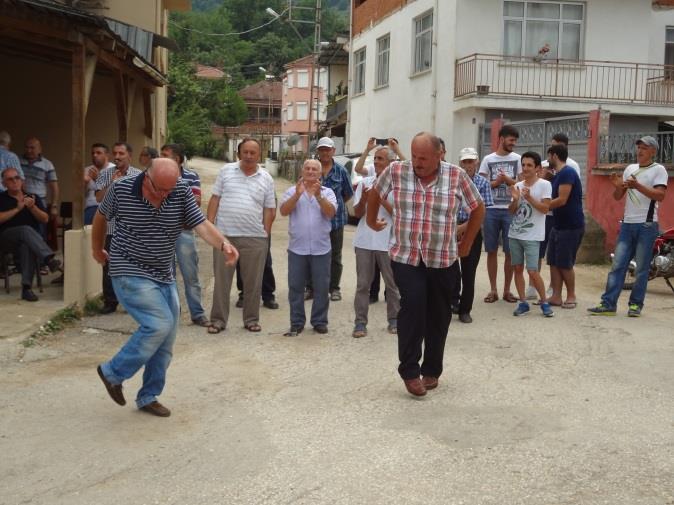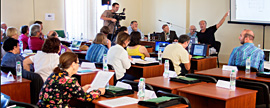Diary of the IRCTP’s Expedition to Inegöl District (Bursa province, Turkey)
3 August, 2015. Istambul
Istanbul on the Bosphorus is alight with gold-en colour. Here East and West intersect as naturally, as the seagull joins water and sky above the strait.
Our Turkish colleague Abdullah Akat is lead-ing us in the city tour. We are heading to Kadıköy, where Iberya Özkan Melaşvili is waiting for us at the House of Georgian Culture. As soon as one steps on the porch, he finds himself in Georgia. The Georgians from Istanbul gather here to study their mother tongue and songs.
4 August, 2015. Inegöl
We are four members in our expedition: Ab-dullah Akat – Head of the Musicology Department of Trabzon State Conservatory, who has studied Black Sea culture for years; Iberya Özkan Melaşvili the son of Ahmed and successor of his traditions; and us Nino Razmadze and Baia Zhuzhunadze from the IRCTP of Tbilisi State Conservatoire. This is our Center’s first expedition in Turkey, a joint (Turkish-Georgian) expe-dition.
Majority of the population in Inegöl city, are ethnic Georgians. There are 21 Georgian villages in Inegöl District, the population has moved here from Machakhela, Chakvi, Shuakhevi, Khulo and Meskheti.
Three generations of Georgians have gathered to meet us at the Society of Caucasian Folklore and Culture. Anyone from their motherland is welcome here with particular love. We start recording instrumental pieces: Khorumi, Qolsarma, Qolsarmas gadaktseuli, Abazurai, Cherkezuli, etc. played on accordion (referred to as muziqa by the locals).
They are upset about the loss of chiboni; in-strumental pieces for chiboni are performed on accor-dion.
6 August, 2015. Inegöl
Yesterday we visited the villages of Sulhiye and Tupekchikonak. We were accompanied by 77-year-old Suat Aktekin from Didachara, he is known as a connoisseur and keeper of Georgian traditions in Inegöl District. Young generation has studied many songs and instrumental pieces from him. At the gathering in his garden later, in the evening, there were all for whom Georgian song and dance is an inseparable part of their life, many young people among them. For us they sang bass part from the song “Dedoplis simghera”. Proceed-ing from the fact that “mqivani part used to be sung on-ly by distinguished singer”, they remembered only its fragments and could not sing it properly. We also rec-orded “Nardanina”, “Vin mogitana”, “Tirni horerama”, “Tetro mamalo”. They were displeased for having for-gotten the songs and not being able to sing together. But polyphonic thinking has survived in their conscious-ness.
After the recording sessions we let them listen to the archival recordings made by Peter Gold and Ah-med Melashvili. Listening to the ancestors’ recordings always makes strong impression on people, often they are not successors of this tradition. But in this particular case, young people below 30 recognized all songs and instrumental pieces; this old repertoire is the means of relation to their motherland.
7 August. Village of Hairiye
I will never forget my emotions at seeing the road-sign with the name Hayriye. All expedition mem-bers immediately cheered up. We congratulated each other for having come here. We had heard so much about this village from Guram Pataraia’s film, Peter Gold’s recordings; and there we go! We will remember this happy instant all our lives.
New Hayriye looks like a European village, with beautiful houses, neat yards, our car stops at the tea house in the village centre. Iberia is welcome with love and respect in his mother’s native village. “Are you chveneburebi?” This question holds entire motherland.
We are heading to visit families of the performers rec-orded by Peter Gold and Ahmed Melashvili. People still sing in these families. They still vividly remember Peter Gold’s visit and recording sessions 47 years ago; then children now already grandfathers remind each other of the details of the recording sessions.
In Ali Osman Gultekin’s family the women performed “Nardanina” with dancing for us. We also found Vesile Khinkiladze, Mrs. Vesile (73) who then sang “Dirge over sister” has professional attitude to the recording process, we do not have to beg her. “When my family was alive performing a dirge was not so dif-ficult for me” – she says, but sings several variants for recording. Then she tells her own verses, she even wrote a play in her youth, which was staged at the vil-lage theatre.
11 August. Village of Hairiye
Once again we made sure that nothing is acci-dental in this world. Yesterday we accidentally met Shenol Shener in one of the tea houses in Inegöl. In the evening he came to the recording session and sang wife’s mourning over husband and offered to accom-pany us to the Tumer family in Hayriye the following day.
Since the day of arrival in Hayriye we have been looking for the performer of “Vin mogitana”, when listening to the recording no one could remember the small boy, after long discussion it was concluded that presumably he had passed away.
We stopped the car near the tea house. All vil-lage was waiting for us, at seeing Shenol, Basri Idimir exclaimed: “This is the boy we are looking for”. Mr. Shenol listened to the recordings but he did not say that it was him in the recording and did not sing “Vin mogi-tana” either. If he had not come with us here today, we would never have heard this. He sang the song for us and told us about its performance form.
Mr. Shener is the discovery of our expedition!
14 August, Istanbul
This is first time that I am returning home with impressions and nostalgia. “Where is another Georgia?” It is here, with this people, in their speech songs and dances. Having come here 145 years ago, they still live with love to their native land.
A man can change history, stop the instant. Had it not been the providence of Ahmed Melashvili’s son, these songs would not have been so vividly pre-served.
The people of our profession are “archivists of the past”. We spend our lives seeking for and archiving all what can possibly be buried in oblivion.
But this is not the case in Inegöl and Hayriye. Young generation here, is well-aware of the value of the past, and will not lose a grain with the flow of time.
Baia Zhuzhunadze, Ethnomusicologist






